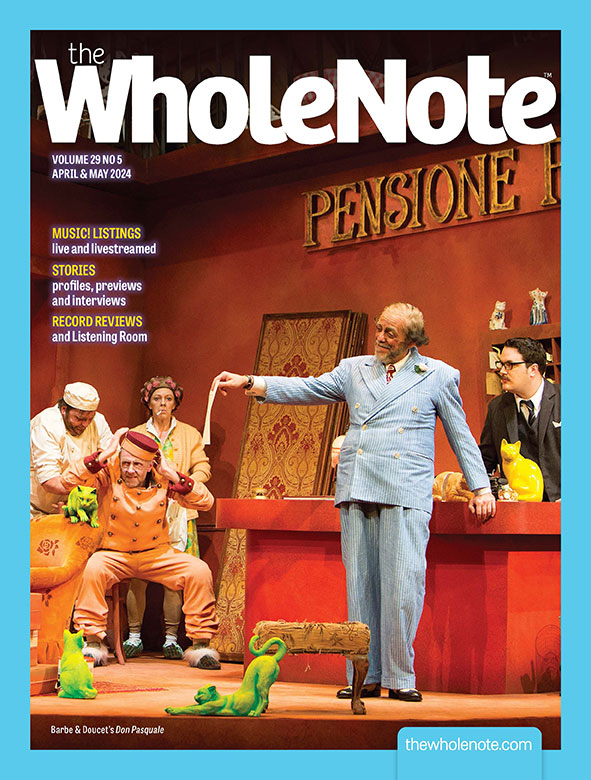Very few topics stir the emotions of copy editors and proofreaders quite as much as the place and placement of the comma in written English. At The WholeNote we don’t quite come to blows about it, but only because we’re either too busy wrestling the next magazine into the dipping tank or, after the fact, too damned tired to fight. The formula: the number of correct opinions on whether or not to use any clearly optional comma is equal to the number of copy editors and proofreaders who examine the instance, plus one: the “plus one” being that the editor-in-chief, moi, is free to change his mind and does, resorting to quoting Ralph Waldo Emerson (A foolish consistency is the hobgoblin of little minds) or Oscar Wilde (Consistency is the last refuge of the unimaginative) whenever pressed, by a crew member close to counselling mutiny, to explain why what was perfectly OK two pages ago suddenly isn’t.
As to the definition of a “clearly optional comma,” and when it should be placed inside or outside quotation marks, these are questions which, if I am ever going to get to the point of all this, will have to be left for another day.
The point? That if I, dancing with my angels during the bright midday of my editorial soul, pause to examine my own fascination with the comma, what it all boils down to is whether in any specific context its use either helps or hinders the reader’s ability to hear the voice of the writer, including when and where they pause, or not, either to catch breath or to caress some particular phrase.
It’s analogous, perhaps, to the choices a conductor must make in terms of when to use a baton or set it aside, when to hold the orchestra tightly by the hand in order to help it across a busy street, or when letting it run free is the greater gift. Or perhaps it’s like the difference between the sound of a choir where the singers are grouped by voice type, rank and file, and the sound of an opera chorus where little heterogeneous knots of singers deploy all over the stage in the service of the story being told. Or like the difference between the sound of a “Hallelujah” chorus, or Frosty the Snowman for that matter, emanating from a sing-along audience, compared to the same things being sung by the choir on the stage.
For me it’s all about voices: about the way our writers make room wherever possible for the words of the people they are writing about; and about the extent to which their own individual voices shine through in what they write: whether, like me, they are vicarious observers of the scene or, as many are, passionate practitioners of the things they write about. Nothing gives me greater pleasure at moments like this, giving the pages about to go to press one final read, than hearing in my mind their individual voices, blending into a great collective musical murmuring from the heart, rising from these pages.
This struggle and friendship is very satisfying to watch, as well as fun. I got that first library job in Phoenix. “The reason I really love the stars, is because we cannot hurt them.” This time it’s a special project for her, one in which she’s invested her creativity on many levels. (It’s also been a special project for me.) Given my carol obsession, I guess I should be sympathetic to these arguments – but I’m not sympathetic to them at all. “Everything: concision, precision, savagery, nobility, discomfort, freedom, knowledge, sweetness... These words are more relevant to this music than to any other.” During the customary playing of The Last Post from the rear of the chapel, I was stunned to hear a real bugle, not a trumpet, being played, in full uniform, by the bugler from The Queen’s Own Rifles Band, flawlessly and with beautiful tone. Speaking about children and sing-along Messiahs reminds me, in a topsy-turvy roundabout way, of a column I recently wrote … One rarely hears such candour expressed by an up-and-coming performer. Messing with Winterreise is a growing and delightful industry within classical music performance. That the work had the incipient power to make me care enough to be pissed off about its deficiencies is a big deal though. Our neighbourhoods begin to look like those in cheesy TV movies, though perhaps without the requisite miracles. Listen to how the songs you know are transformed, revivified, re-presented in ways that break the cynical purgatorial cycle of streaming-platform playlists, emerging, finally, alive again.
Finally, here’s jazz columnist Steve Wallace on the act of giving inherent in jazz: The exchange is circular, as there is an unspoken pact between jazz players and their audience which goes something like this: give us your attention, your ears, and we musicians will give you our very best – or at least try to – and make some music, out of thin air.
To all our contributors who month in and month out throw your voices into the thin air, and to all our readers who give us your ears, thank you for your gifts.
publisher@thewholenote.com




